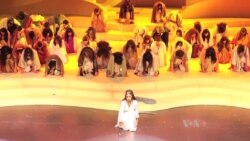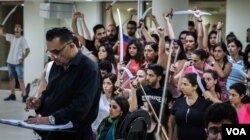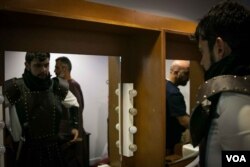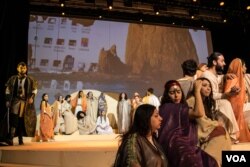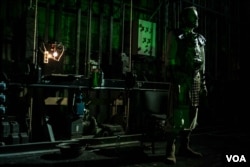This weekend Lebanon’s only opera troupe put on the opening public performance of a truly Arabic opera.
In doing so, this group doesn't just want to put on a good performance - they want to show the world the best of Arabic culture, shaking up this often traditional art form in the process.
“The Arab world is starting a very important phase. It’s a turning point in art and music,” claimed Maroun Rahi, composer, conductor and founder of Opera Lebanon.
Rahi is a leading figure at the Lebanese National Higher Conservatory for Music, where he has been working on a grandiose project.
Not satisfied with putting on versions of opera classics like Carmen, he teamed up with librettist Antoine Maalouf, among others, for something more ambitious and, Rahi claims, "unique."
The idea was to create an opera to be written and performed in Arabic, using Arabic music, and telling a tale not from Europe but the Middle East.
Rahi has helped develop curriculum to train students for the task, an effort that he says first began more than 160 years ago by his predecessors in Lebanon and beyond but has only become possible recently.
“I saw the team was complete - that there were people who could support this opera,” he added.
Immortalized in a poem
At the heart of their efforts is a tale based on a sixth century Arab poet and warrior, Antar, a former slave who falls in love with Abla, a princess.
Immortalized in the form of an epic poem, it remains widely known across the region.
“Opera may not have been in our culture, but we have poetry- we have this poem,” explained co-director Joseph Sassine.
But if the story seemed like the perfect fit to be turned into an opera, many of the other elements have been a struggle.
Unlike their contemporaries elsewhere in the world, the 80-strong team assembled to make the idea a reality had no opera house to train in - university theaters and municipal buildings made do.
Meanwhile, most of the backing cast were choir members from the Conservatory, which also provided the orchestra.
Whether teenagers dreaming of a career in music, or older members pursuing their passion as a hobby outside of work, for many of these students, the idea of acting was something entirely new.
Still, after a year of rehearsal, despite admitting to feeling the pressure of what he calls a “big challenge” Sassine is full of praise for his cast. “They’ve been so enthusiastic - they’ve been working for five days a week,” he added.
Steep curve
Even for those with experience, the process has proved to be a steep learning curve.
Playing the character of Mared Tay, Maxime Chami is essentially the villain of the piece, a spurned love rival to Antar.
For Chami, who has studied western classical singing in both Rome and Paris, the challenge is within the Arabic language itself.
“You have consonants that don’t exist anywhere else, only in Arabic,” he explained, “and a few are very difficult to pronounce when you want to project your voice.”
But such obstacles are worth overcoming, he added, for the opportunity to give a performance worthy of his mother tongue.
“When we translate an Italian opera the words will not be balanced with the music. Now it’s the first time the words and music are balanced as they are written together - you can feel it more, you can express it more when it’s in your language.”
Another face
It is this concept of expression that runs to the heart of the project.
The curtain lifted this weekend on two performances taking place in a large theater within Lebanon’s opulent Casino du Liban.
For Lara Jokhadar, who plays Abla, the show will be about far more than than just providing a spectacle, or proving doubters wrong.
These two nights, she adds, could just be the start of something far bigger - efforts are under way to organize an international tour - both in offering something new to the opera oeuvre and in developing the scene locally.
They will be also about giving a voice to the rich arts, culture and history of a region all too often viewed elsewhere in the world through a lens of conflict or instability, she added.
“It’s important to show another face of Arab culture,” Jokhadar told VOA.
“We’ve been categorized as the bad guys. But what the world is seeing is not all Arabic people are - there are geniuses here, not only in technology, medicine and science, but geniuses in theater and acting.
“We’ve put that all together to produce this Arabic opera and it holds a message of peace to the whole world.”




